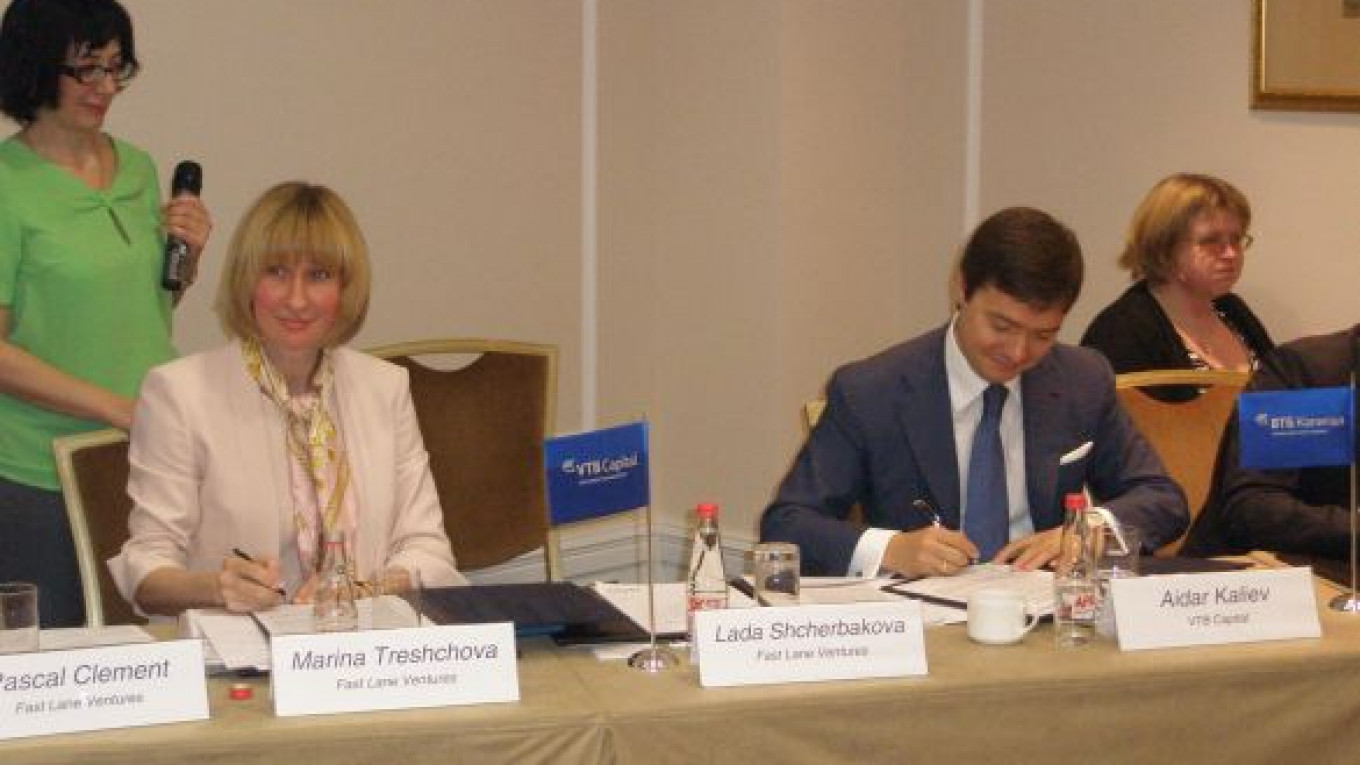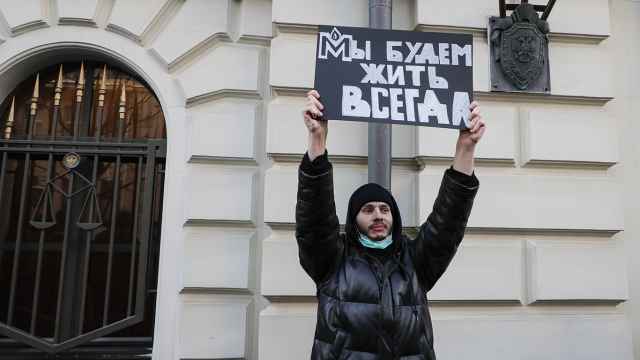This week’s $75 million injection into classifieds advertising site Avito.ru is further proof of the investment attractiveness of Russian startups, which are a key element in the government’s push for diversifying the country’s energy-dependent economy.
But while innovative ventures are offering big opportunities, they are desperate for investors who are able to give not just cash but experience as well.
“It’s not a problem to find entrepreneurs or good honest people,” said Esther Dyson, an investor in the country’s
No. 1 search engine Yandex, where she also serves as nonexecutive director.
“The problem is finding the next group — entrepreneurs who were successful, sold and are now angel investors,” she said at a conference last week for the first-ever business angel week in Russia.
Business angels are investors who not only finance entrepreneurial projects at an early stage, risking their own money, but also support the project with their business experience and contacts.
Also attending the conference, Rusnano director Anatoly Chubais said diversification of the economy financed by the private sector was “broadly needed” and added that if the economy does not wean itself off its current 80 percent dependence on natural resources, it would no longer be able to compete with the rest of the world.
Attendees at the conference, which started in Moscow but continued for a week across 25 regions of Russia, came from around the globe to discuss how they could take an active role in jump-starting the country’s early-stage funding infrastructure.
Globally, 90 percent of early-stage capital is provided by business angels, and startups with an angel investor on board are four times more likely to succeed, said Konstantin Fokin, the president of the National Association of Business Angels in Russia.
However, seed funding — investments at the earliest stage to help fledgling companies turn their ideas into products and bring that product to market — is a very new concept in Russia.
Fokin estimates that on average business angels invest only $300 million a year in Russian startups, though he admits that there are no completely reliable sources for that data.
For comparison, the European Business Angel Network, or EBAN, which coordinated its 12th congress with the Russian business angel week, is made up of 17,000 business angels who invest 3 billion euros to 4 billion euros ($4 billion to $5.3 billion) each year, EBAN chief Brigitte Baumann said. The U.S. market tends to be at least three to five times larger, she added.
Only 30 percent of angel investors in Russia are really active — people who understand their role and search for strategic partners, said Tatyana Komissarova, director of the center for marketing innovation at the Higher School of Economics.
State Role
The government has taken an active role in facilitating financing for startups by investing just over 30 billion rubles ($1 billion) into Russian Venture Capital, or RVC, in June 2006.
RVC acts as a “fund of funds.” It doesn’t invest directly into projects, but instead has created 12 separate venture funds to focus on specific areas — from biotech to space and transportation systems — which have co-invested 9.1 billion rubles in 104 companies as of March.
However, startups in Russia in their beginning stage usually don’t receive investments from venture capitalists, said Yan Ryazantsev, RVC’s director of investments.
“Usually [venture capitalists] invest when a company is selling products, or when it is ready to sell [shares] on the stock exchange. There are very few companies on the Russian market at this stage.”
“So the task at hand is to develop an entire set of small-sized funds for seed funding,” to help companies that at best only have a prototype, and often lack customers, Ryazantsev said.
To assist in this process, the Moscow city department of science, industrial policy and entrepreneurship with professional support from RVC announced the creation of the Moscow Seed Fund on Monday, April 23.
This fund will offer credit of up to 8 million rubles for five years to startups that have already found an initial investor, said Alexei Kostrov, executive director for the Moscow Fund for Developing Venture Investments, which will operate the seed fund. The fund hopes to be a bridge for fledgling entrepreneurs to reach commercialization and expand the country’s economy.
Avito.ru is a good example of how the investment pattern can successively play out for Russian startups. The company started with $10 million in seed money that came from two of its founders, chief executive Jonas Nordlander and fellow Swede Filip Engelbert, and two investment firms. Venture funds came on board later, during a $26 million first round of funding in 2010 followed by the $75 million round announced Wednesday.
Fast Returns
But “the problem with investors,” Komissarova of the Higher School of Economics said, “is that they want returns within two to three years. And for some of these projects, it is five years.”
The size and opportunity of returns on investment are mostly unknown in Russia, said Alexandra Dieterink, director of Azure Invest Group, a Moscow-based private equity and venture capital advisory boutique. Most Russian companies don’t tend to disclose such data and there haven’t been many exits in the Russian venture capital sector as of yet, she added.
An exit is when an investor cashes out — by selling their share to a larger investor or through an initial public offering, or IPO.
The most well-known exits have been from Sapato, Qik, Evernote and EPAM, said Kanr Lidzhiyev of Preqveca.ru, an analytical website devoted to Russia and CIS private equity and venture financing. He estimated that these companies yielded returns of eight times, 10 times and even higher.
“But, no one mentions the failures,” he said. “There are a few super-successful exits and an unknown number of failed investments.”
Investors have seen returns most recently at Internet companies, including Yandex, whose IPO raised $1.3 billion, Bloomberg reported in May 2011. Individual investor returns on investments were not disclosed.
But the Internet investment market is very young. Only on April 24, VTB Capital Venture Business — the leading venture capital firm in Russia and the CIS, which is part of the giant state lender VTB — recognized the prowess of Internet startups by putting $18 million into Fast Lane Ventures, which was created in 2010 to invest in the Russian Internet market.
And though the amount of capital being put up is rising, it tends to show up at later stages in the process.
According to research performed by Fast Lane Ventures, $1.3 billion was invested into Russian Internet companies in 2010 and $2.15 billion in 2011. But out of last year’s number, only $750 million went to businesses at the startup stage.
For Internet startups, “there is really a small number of qualified investors,” Lidzhiyev said. “They are seizing the best opportunities and are enjoying an IRR [internal rate of return] that is higher than for U.S. or European venture capitalists on developed markets with fierce competition.”
To fill that void, RVC’s Ryazantsev believes that it is necessary for entrepreneurs and investors in Europe, Russia and the United States to discover one another. “The more they interact, learn from one another, understand one another, the more they will drive one another forward.”
“We need more practical steps,” said Fokin, Russia’s business angel association head. “The EBAN congress has been one step.”
By continuing the discussion at 40 events in 25 regions of Russia, the European group, visiting for the European congress, will learn from and educate their Russian counterparts as the country undertakes the slow process of forming structures from the ground up — an approach Chubais said he finds incredibly important because the financial infrastructure cannot be created from the top down.
Experienced venture capitalists agree that limiting the state’s role is the correct policy.
Yandex’s Dyson — who has personally been investing in U.S. and Russian technology startups for many years — said governments should not pick specific investments: their role is to provide infrastructure and education, not help private companies compete with one another.
“When the government takes a risk, it is successful three times and fails 20 times. If you just leave people alone, they’ll do amazing things,” she said.
Staff writer Rachel Nielsen contributed to this story.
A Message from The Moscow Times:
Dear readers,
We are facing unprecedented challenges. Russia's Prosecutor General's Office has designated The Moscow Times as an "undesirable" organization, criminalizing our work and putting our staff at risk of prosecution. This follows our earlier unjust labeling as a "foreign agent."
These actions are direct attempts to silence independent journalism in Russia. The authorities claim our work "discredits the decisions of the Russian leadership." We see things differently: we strive to provide accurate, unbiased reporting on Russia.
We, the journalists of The Moscow Times, refuse to be silenced. But to continue our work, we need your help.
Your support, no matter how small, makes a world of difference. If you can, please support us monthly starting from just $2. It's quick to set up, and every contribution makes a significant impact.
By supporting The Moscow Times, you're defending open, independent journalism in the face of repression. Thank you for standing with us.
Remind me later.






